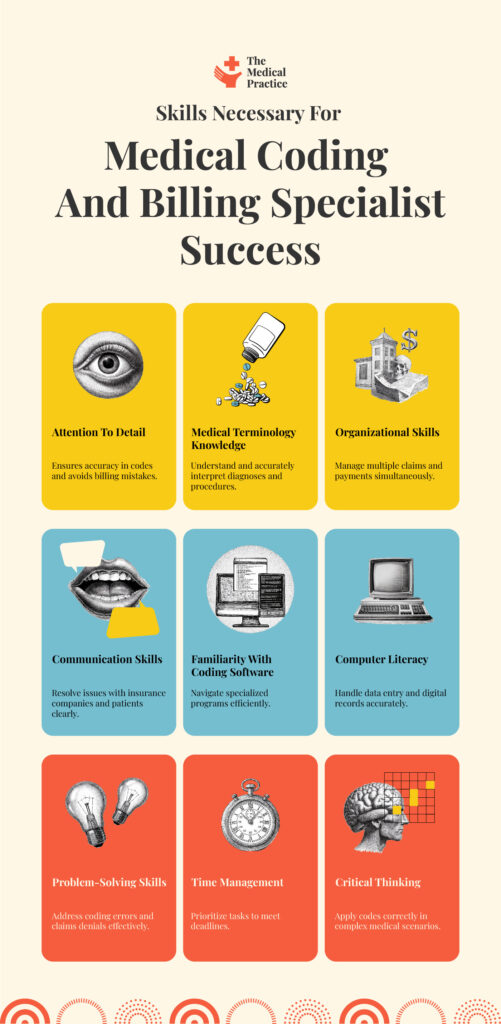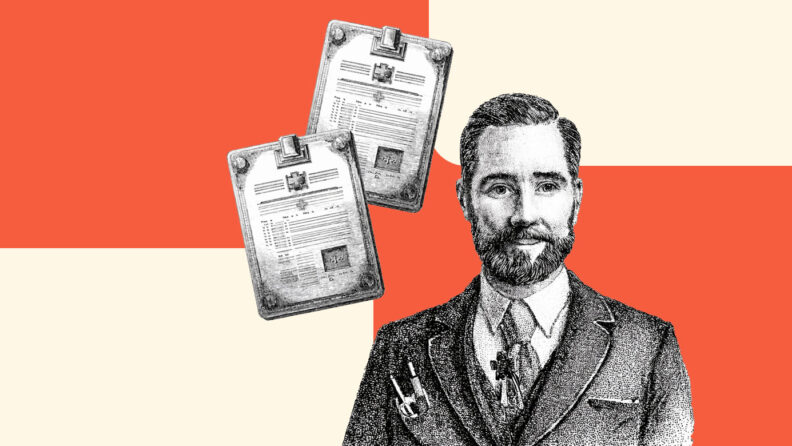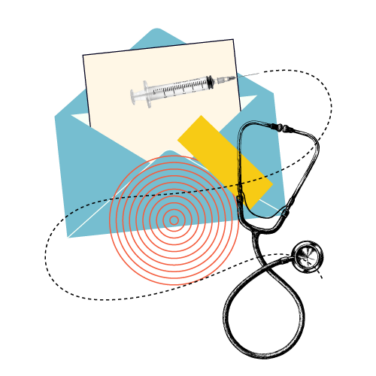Medical billing specialists play a crucial role in healthcare, managing patient records and handling insurance claims, making them vital components of the healthcare system.
Mastering insurance claims is essential for medical billing specialists, ensuring that healthcare providers get reimbursed correctly and efficiently for their services.
Success as a medical billing specialist hinges on strong organizational skills, enabling them to maintain accurate records and streamline billing processes.
This career allows individuals to contribute to patient care indirectly, supporting healthcare providers and easing the financial aspects of medical services.
Becoming a medical billing specialist can be a stepping stone into the broader healthcare field, offering opportunities for advancement and further education.
Are you ready to dive into the world of healthcare, but prefer to work behind the scenes? Becoming a medical billing specialist might be your perfect fit! From managing patient records to mastering the art of insurance claims, medical billing specialists are the unsung heroes of the healthcare system.
In this guide, I’ll walk you through the steps to kick-start your career, from education requirements to polishing your medical billing resume—because getting paid isn’t just for patients, it’s for you too! Let’s get started on your path to this rewarding and detail-driven profession.
What Do Medical Billers Do?
Medical billers manage the financial side of healthcare. They take the codes that describe what services a patient received and turn them into bills to send to insurance companies.
Medical billers also handle healthcare payment systems, follow up on unpaid claims, and make sure healthcare providers get paid. They often work with patients, insurance companies, and healthcare providers to resolve any issues with payments or insurance claims.
The healthcare industry relies on skilled billing professionals who understand insurance billing and can manage patient accounts in various healthcare settings. Medical billing specialists often collaborate with medical assistants to ensure accurate documentation and billing for patient records.
Staying informed about State-specific medical billing deadlines is a key responsibility for a medical billing specialist, too.
What Is The Job Description Of A Medical Coder And Biller?
Medical billing and coding plays a critical role in healthcare. Coders take the treatments and procedures performed by healthcare providers and convert them into standardized codes, used for billing and record-keeping.
Medical billers then use those codes to create and submit claims to insurance companies, ensuring that the healthcare providers are reimbursed for their services. They often work together to make sure that the coding is accurate and the claims are paid on time.
Job Duties Of Medical Coders
Medical coders are responsible will typically handle the following:
- Review patients' medical records.
- Translate diagnoses, treatments, and procedures into standardized codes.
- Use codes for medical billing, insurance claims, and record-keeping, including specialized codes like z codes.
- Ensure accuracy to avoid claim denials or payment delays.
- Work in clinics, hospitals, or remotely.
- Utilize specialized medical billing software.
Job Duties Of Billing Specialists
Billing specialists handle the financial side of medical coding. After coders assign the appropriate codes to medical procedures, billing specialists create bills for insurance companies and patients.
They track payments, follow up on unpaid claims, and correct any issues with claims denials, typically by leveraging features present in medical billing software solutions at play. Billing specialists often interact with both patients and insurance representatives to resolve disputes, manage payment plans, and ensure that healthcare providers get paid for their services.
Understanding eligibility for health insurance coverage is crucial for medical billing specialists working in medical offices or healthcare settings. Medical billing specialists must know how medical billing works, how to manage health records, and how to ensure compliance with HIPAA regulations while processing ICD-10-CM codes. Accurate medical insurance claims are vital for processing patient accounts and ensuring timely payments from payers.
How Much Do Medical Billers Make?
The salary for medical billers can vary depending on factors like experience, location, and the type of healthcare facility they work for. On average, medical billers make between $35,000 and $50,000 per year. With experience or additional certifications, they can earn higher salaries.
Medical billers working in larger hospitals or specialized clinics may also see higher earnings compared to those working in smaller practices. Medical billing managers will make higher pay than, say, a coordinator or associate.

Skills Necessary For Coding And Billing Success
Here are skills you will need in any medical coding and billing field:
- Attention to detail: Ensures accuracy in codes and avoids billing mistakes.
- Medical terminology knowledge: Understand and accurately interpret diagnoses and procedures.
- Organizational skills: Manage multiple claims and payments simultaneously.
- Communication skills: Resolve issues with insurance companies and patients clearly.
- Familiarity with coding software: Navigate specialized programs efficiently.
- Computer literacy: Handle data entry and digital records accurately.
- Problem-solving skills: Address coding errors and claims denials effectively.
- Time management: Prioritize tasks to meet deadlines.
- Critical thinking: Apply codes correctly in complex medical scenarios.
Plus, make sure you have a deep understanding of medical billing and its importance in the daily tasks of a medical billing and coding specialist.
How Do I Become A Medical Biller?
To become a medical biller, you usually need a high school diploma or GED, followed by completing a specialized training program in medical billing. These programs are offered at community colleges or online.
Many entry-level positions in the medical billing field require a credential like passing the national certification exam or completing an associate degree program. Many medical billing specialists start their career with an associate degree in health information management, focusing on fundamentals like insurance billing and health records.
Many billers choose to become certified through organizations like the AAPC, which can make you more competitive in the job market. Once you're certified, you can start applying for jobs in hospitals, clinics, or billing companies.
You should ensure you are prepared for standard medical billing interview questions, too, so that you can make a good first impression, get the job you want, and negotiate the best starting salary for yourself.
Typical Medical Billing & Coding Certifications
According to the Bureau of Labor Statistics (BLS), the demand for full-time medical billing specialists is projected to grow up to 22% in the coming years, especially in states like California. Now is a good time to get certified in this growing career space:
Here are four typical medical billing and coding certifications you can try:
Certified Professional Biller (CPB)
The CPB certification, offered by AAPC, focuses on billing procedures, coding, and regulatory compliance. It ensures professionals are skilled in managing billing processes and working with insurance claims.
Certified Professional Coder (CPC)
The CPC is a widely recognized coding certification provided by AAPC. It demonstrates expertise in assigning correct codes for diagnoses and procedures in medical settings.
Certified Coding Specialist (CCS)
Offered by AHIMA, the CCS certification is tailored for coders specializing in hospital environments. It focuses on coding for complex inpatient and outpatient services.
Certified Medical Reimbursement Specialist (CMRS)
The CMRS, offered by AMBA, is designed for professionals who handle medical billing and reimbursement processes. This certification emphasizes billing best practices and regulatory compliance
Medical Billing Education
Here are some medical billing programs and certifications you might require from a new hire, or endeavor to complete if you are hoping to work in medical billing yourself:
- Medical billing degrees are more traditional 2- or 4-year educational programs found at many universities and colleges.
- Medical billing and coding training can be useful for upskilling your talents yearly.
- Medical billing and coding courses will work in tandem with your degree, indicating which actually classes and sessions to enroll in.
- Healthcare finance courses are similar to the above, but may detail more about financial management and revenue cycles.
- Medical billing programs can often lead to specialized certification, without the time commitment of a degree.
Potential Careers & Salaries For Medical Billing & Coding Graduates
| Career | Average Salary (USD) |
| Medical Billing Specialist | $35,000 - $55,000 |
| Medical Coder | $40,000 - $60,000 |
| Medical Records Coordinator | $45,000 - $65,000 |
| Certified Coding Specialist (CCS) | $50,000 - $70,000 |
| Health Information Technician | $35,000 - $55,000 |
| Medical Claims Analyst | $45,000 - $65,000 |
| Medical Billing Manager | $55,000 - $80,000 |
| Compliance Officer | $60,000 - $90,000 |
Medical Billing Tools to Know
Here are some other billing tools, systems, and services that might interest you.
There are many types of medical billing software that you should become familiar with if you are pursuing a job in medical billing and coding.
Conclusion
To stay updated on the latest trends, best practices, and solutions related to your medical practice, subscribe to The Medical Practice newsletter.



